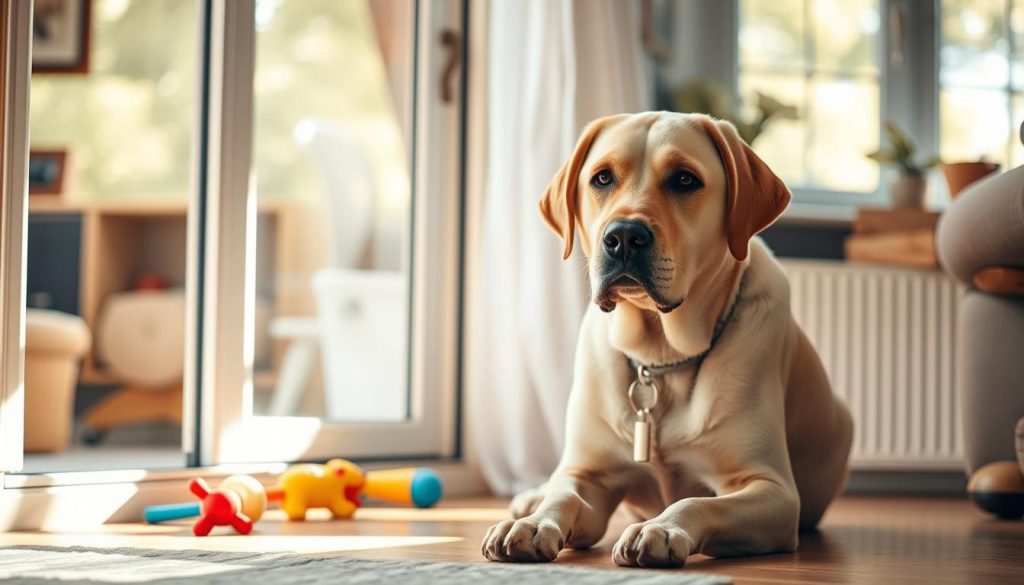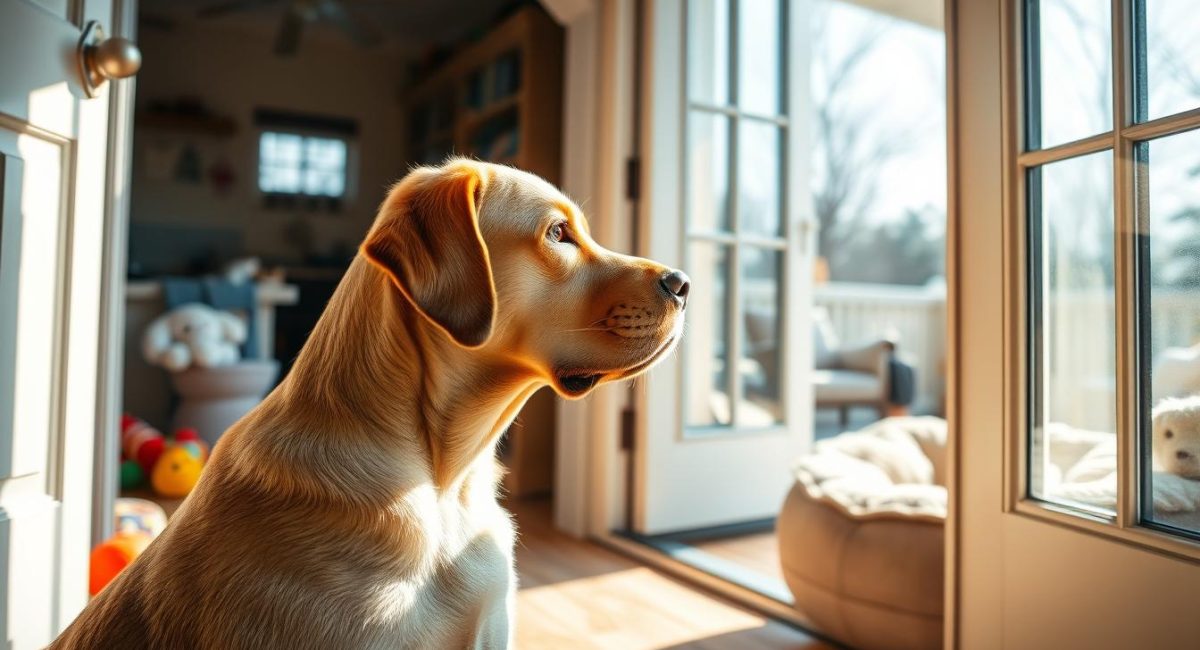Labrador Retrievers: Prone to Separation Anxiety?
Did you know Labrador Retrievers are the top breed for separation anxiety1? They are known for their strong bond with their owners. This can lead to distressing behaviour when left alone. It’s important for owners to understand and manage this anxiety for their dog’s well-being.
Separation anxiety in dogs happens when they’re left alone for too long1. Besides Labradors, breeds like Border Collies and German Shepherds also struggle with it1. As the most popular family dog, Labradors’ tendency to separation anxiety is a big concern for their happiness and their owners’ peace of mind.
Key Takeaways
- Labrador Retrievers are the top breed most likely to exhibit signs of separation anxiety.
- Separation anxiety in dogs can be triggered when left alone for extended periods.
- Other breeds prone to separation anxiety include Border Collies, Jack Russell Terriers, German Shepherds, Vizslas, and German Shorthaired Pointers.
- Labradors are the most popular family dog breed, making their susceptibility to separation anxiety a significant concern for pet owners.
- Understanding the causes and management of separation anxiety in Labradors is crucial for their well-being and the peace of mind of their owners.
Understanding Separation Anxiety in Dogs
Many dog owners worry about separation anxiety, especially in breeds like Labrador Retrievers. These dogs often get very upset when left alone2. This can cause them to bark a lot, chew things they shouldn’t, and even go to the bathroom inside.
Signs of Separation Anxiety in Labradors
Labrador Retrievers are known for their strong bond with their owners. They can get very upset when left by themselves2. They might bark, howl, or whine a lot. They can also get very attached and destructive when their owner comes back.
Labradors are more likely to get separation anxiety because of their genetics2. Changes in their life, like moving or losing a guardian, can also trigger it2.
| Symptom | Description |
|---|---|
| Excessive Vocalisation | Barking, howling, or whining when left alone |
| Destructive Behaviour | Chewing, scratching, or digging, particularly around doors and windows |
| House Soiling | Urinating or defecating in the home when left alone |
| Hyper-Attachment | Excessively greeting or following the owner upon their return |
Knowing the signs of separation anxiety in Labradors is key to helping them2. Owners can work with vets or trainers to find ways to make their dogs feel better when they’re alone3.
Why Do Labradors Develop Separation Anxiety?
Labrador Retrievers are known for their love and social nature. This makes them more likely to feel anxious when left alone4. If a Labrador shows distress when you’re about to leave, it might be suffering from separation anxiety4.
Labradors can easily get anxious about being left behind, especially if they’ve been rehomed4. Changes in their routine or environment, like losing a family member, can also cause anxiety4.
Labradors are very social and love to please people. This makes them more likely to get anxious when left alone5. Signs of this anxiety include barking, whining, and trying to escape5.
Not all Labradors react the same to being left alone. Some might just get bored and destructive4. Dogs left alone for too long, especially when young, are more likely to get anxious or destructive4.
To help a Labrador with separation anxiety, you can try a few things. Start by gradually getting them used to being alone. Make sure they have a safe and comfy space. Use toys and puzzles to keep them busy, and always reward good behaviour5.
It’s also good to keep their routine consistent and avoid long goodbyes. If you’re still struggling, don’t hesitate to seek professional help5.
In short, Labradors can get anxious due to their strong social bonds, fear of being left, and changes in their environment. Knowing why and how to manage this can help your Labrador feel better456.
Ruling Out Other Potential Issues
Before tackling separation anxiety in a Labrador Retriever, it’s key to check for any medical issues7. Problems like incontinence, urinary tract infections, hormonal imbalances, and neurological issues can look like separation anxiety7. A vet must examine the dog to find the real cause and plan the right treatment7. Only then can we focus on the behaviour problems linked to separation anxiety.
Other issues to think about include submissive or excitement urination, incomplete house training, and excessive barking7. These can look like separation anxiety7. It’s important to tell them apart to treat the dog right7.
Incontinence can be due to many medical reasons, like infections or neurological issues7. Medications can also make dogs pee more, leading to accidents in the house.
A study found that dogs from shelters are more likely to have separation anxiety7. Changes in the family or moving can also trigger it8.
“Separation anxiety often affects young dogs, although older dogs can also develop the condition8. Triggers for separation anxiety in dogs can include sudden schedule changes, moving to a new house, or the absence of a family member8.”
It’s vital to find the cause of a Labrador’s behaviour problems for effective treatment7. By checking for medical issues and differentiating conditions, a vet can diagnose and treat dog anxiety properly.
Are Labrador Retrievers prone to separation anxiety?
Labrador Retrievers, including White Labs and English Cream Golden Retrievers, have a strong bond with humans. This can lead to separation anxiety when left alone9. They might bark a lot, chew furniture, or pace around the house9. Their social and affectionate nature makes them especially prone to this issue5.
Changes in routine, past traumas, and lack of stimulation can trigger separation anxiety in Labradors9. They might also have accidents indoors or try to escape5. To manage this, training, behaviour modification, and positive reinforcement are key9.
Regular exercise helps Labradors relax when alone9. Creating a safe space, using interactive toys, and establishing routines are also effective5. If these steps don’t work, professional help from vets and behaviourists might be needed9.
Online and community support can offer advice and emotional support to owners dealing with separation anxiety9. While not all Labradors will experience it, their breed characteristics increase their risk9.

| Factors Contributing to Separation Anxiety in Labradors | Effective Strategies for Managing Separation Anxiety |
|---|---|
|
|
“While separation anxiety is not a foregone conclusion for all Labradors, their breed characteristics do place them at a higher risk compared to some other dog breeds.”
In conclusion, Labrador Retrievers are at high risk for separation anxiety due to their temperament and origins as working dogs. Understanding the risk and using effective strategies can help owners keep their Labradors happy and healthy95.
Counter-Conditioning and Desensitization
For Labrador Retrievers with dog separation anxiety, using counter-conditioning techniques and desensitization process can help. Counter-conditioning teaches the dog to enjoy being left alone. This is done by giving them a food-stuffed toy or puzzle10.
This method changes the dog’s feelings about being left alone. It makes something scary into something fun.
Treating Moderate Separation Anxiety
11 Desensitization means slowly getting the dog used to being alone. It starts with very short times and gets longer. This gradual exposure methods teach the Labrador that being alone is okay11.
The goal is to increase the time the dog is alone without causing anxiety. Too much, too soon, can make things worse.
11 Finding the right amount of exposure is key. It should be enough to challenge the dog but not too much. Rewards help reduce fear and anxiety11.
Replacing bad behaviours with good ones is also helpful. This is called response substitution. It’s a part of the treatment plan.
11 With the help of a certified animal behaviourist, Labradors can overcome dog separation anxiety11. Working with experienced trainers or behaviourists is important for severe cases. They ensure the training is done right.
Managing Pre-Departure Cues
Dealing with separation anxiety in Labrador Retrievers means tackling the cues that make them anxious. Things like putting on shoes or jingling car keys can make them worry when you’re leaving12.
Changing these cues can help your dog feel less anxious. Try new routines, avoid obvious signs of leaving, and don’t reassure them too much before you go12.
Dogs that weren’t socialised well as puppies might get anxious as adults13. Rescue dogs often miss out on socialisation, leading to anxiety13.
By making departure routines different from leaving, you can lower your dog’s anxiety. This is key in fighting their separation anxiety12.
Big changes in family or routine can also cause anxiety in dogs13. Some breeds are naturally more anxious13.
Managing these cues is a big part of helping your Labrador with separation anxiety. By removing these triggers, your dog will feel calmer when you leave12.
Providing Mental Stimulation and Exercise
Keeping a Labrador Retriever happy and active is key to managing separation anxiety. Labradors are full of energy and love to work. They need lots of exercise and mental challenges14.
Before you leave, make sure your Labrador has had a good run or playtime. Interactive toys and puzzles can keep them busy and prevent bad behaviour when you’re away. This way, you meet their need for activity and problem-solving, reducing their anxiety14.
Keeping Your Labrador Occupied
- Invest in puzzle toys and food dispensers that challenge your Labrador’s natural foraging instincts.
- Rotate a selection of interactive toys to keep your dog engaged and prevent boredom.
- Hide treats around the house for your Labrador to sniff out and discover.
- Engage your Labrador in training sessions, teaching new commands or tricks to stimulate their mind.
- Consider enrolling your Labrador in canine sports like agility, flyball, or dock diving to channel their energy.
Enough exercise and mental challenges can prevent bad behaviour and boredom. These are big factors in reducing separation anxiety in Labradors14.
“A tired dog is a happy dog. Ensuring your Labrador gets enough exercise and mental stimulation is crucial for their well-being and preventing separation anxiety.”
| Enrichment Activity | Benefits |
|---|---|
| Interactive Toys | Stimulates foraging instincts, reduces boredom |
| Training Sessions | Provides mental exercise, strengthens bond |
| Canine Sports | Channels high energy, builds confidence |
Adding these activities to your Labrador’s routine keeps them active and happy. This reduces the chance of separation anxiety and bad behaviour15.
Medication and Natural Remedies
For some Labrador Retrievers, anti-anxiety medication or natural calming supplements may be necessary. Vetted treatments, such as generic Clomipramine Hydrochloride tablets, have been shown to be safe and efficient in addressing anxiety disorders in dogs6. These pharmaceutical options can be used with behavioural modification techniques. This provides a comprehensive treatment plan tailored to the individual dog’s needs.
Some pet owners have found success using natural calming supplements, like CBD oil, to help reduce their Labrador’s stress when left alone6. It is crucial to always consult a veterinarian before administering any medication or supplement. This ensures it is appropriate and safe for your canine companion.
- Anti-anxiety medications prescribed by a veterinarian can be effective in treating separation anxiety in Labradors6.
- Natural calming supplements, such as CBD oil, may also help alleviate a Labrador’s stress when left alone6.
- It is essential to work closely with a vet to determine the best treatment plan, whether it involves medication, natural remedies, or a combination of approaches6.
| Medication | Natural Remedies |
|---|---|
| Generic Clomipramine Hydrochloride tablets | CBD oil |
| Vet-approved anti-anxiety medications | Other calming supplements |

The decision to use medication or natural remedies should be made in consultation with a veterinarian. They can evaluate the specific needs of the Labrador Retriever. They will recommend the most appropriate, vet-approved treatments for canine separation anxiety616. A holistic approach that combines behavioural modification techniques and targeted interventions can be effective. It helps Labradors feel more comfortable when left alone6.
Conclusion
In conclusion, Labrador Retrievers are a beloved breed known for their strong bonds with their owners. Unfortunately, this can make them prone to separation anxiety2. It’s important for owners to understand the signs, causes, and how to manage this condition.
Using techniques like counter-conditioning and desensitisation can help. Providing plenty of mental and physical stimulation is also key. This way, pets can feel secure and happy when left alone2.
Labrador Retrievers are generally healthy17. But, it’s crucial to check for any medical issues that might cause anxiety. Sometimes, medication or natural remedies are needed, but always with a vet’s advice2.
Keeping a consistent daily routine and introducing crate training carefully can help. Starting early with scheduled alone time is also effective2.
By tackling the root causes of separation anxiety and getting professional help, Labrador owners can ensure their pets’ happiness and health2. It’s vital to promote the wellbeing of Labradors and support their natural inclinations. This strengthens the bond between humans and dogs17.
FAQ
Are Labrador Retrievers prone to separation anxiety?
Yes, research shows Labradors are likely to have separation anxiety. This is because they bond strongly with their owners and were bred to work.
What are the signs of separation anxiety in Labradors?
Signs include barking a lot, chewing things up, and soiling the house when alone.
What factors contribute to separation anxiety in Labrador Retrievers?
Their social nature and need to please people can lead to separation anxiety. Changes in routine or past experiences of abandonment also play a part.
How can underlying medical issues be ruled out when addressing separation anxiety?
First, check for medical problems like incontinence or infections. Hormonal or neurological issues could also be causing the behaviour.
Are Labrador Retrievers more prone to separation anxiety compared to other dog breeds?
Yes, Labradors are more likely to get separation anxiety. Their temperament and history as working dogs make them struggle when left alone.
How can counter-conditioning and desensitization techniques help manage separation anxiety in Labradors?
For mild cases, counter-conditioning and desensitization can help. Counter-conditioning teaches the dog to enjoy being alone. Desensitization gradually gets them used to being alone for longer.
How can managing pre-departure cues help reduce a Labrador’s separation anxiety?
Changing what the dog sees before you leave can help. Avoiding triggers like putting on shoes or jingling keys can reduce their distress.
How can providing mental and physical stimulation help manage separation anxiety in Labradors?
Keeping them busy is key. A good walk or play session before you leave helps. Interactive toys and puzzles keep them occupied and less destructive when alone.
When might medication or natural remedies be necessary to manage a Labrador’s separation anxiety?
Sometimes, medication or natural remedies are needed. Anti-anxiety meds and calming supplements like CBD oil can be safe and effective when used with behaviour changes.
Source Links
- 10 dog breeds most likely to suffer from separation anxiety – https://www.countryliving.com/uk/wildlife/dog-breeds/a37125946/dog-breeds-suffer-separation-anxiety/
- Why Do Dogs Develop Separation Anxiety? – The Pet Coach | Dog Separation Anxiety Specialist | Certified Companion Animal Behaviourist – https://petcoach.co.uk/why-do-dogs-develop-separation-anxiety/
- No title found – https://www.akc.org/expert-advice/health/treating-dog-anxiety/
- Does my Labrador have Separation Anxiety – https://www.thelabradorsite.com/does-my-labrador-have-separation-anxiety/
- Separation Anxiety Solutions for Labradors | labrador-owners.co.uk – https://www.labrador-owners.co.uk/info-guides/separation-anxiety-solutions-for-labradors
- What to do if your dog has separation anxiety | Dogs Trust – https://www.dogstrust.org.uk/dog-advice/understanding-your-dog/separation-anxiety-in-dogs
- Separation Anxiety – https://www.aspca.org/pet-care/dog-care/common-dog-behavior-issues/separation-anxiety
- No title found – https://www.akc.org/expert-advice/training/dog-separation-anxiety/
- Overcoming Separation Anxiety in White Labs & English Cream Golden Retrievers – https://www.snowypineswhitelabs.com/blog/understanding-separation-anxiety-in-white-labs-and-english-cream-golden-retrievers/
- How to Prevent Separation Anxiety in Dogs | Bond Vet – https://bondvet.com/b/how-to-prevent-separation-anxiety-in-dogs
- Desensitization And Counterconditioning | Best Friends Veterinary Center – https://bestfriendsvet.com/library/desensitization-and-counterconditioning/
- How To Help a Dog With Separation Anxiety – https://www.petmd.com/dog/training/how-help-dog-separation-anxiety
- How to spot and cope with dog separation anxiety – Groomers | Blog – https://www.groomers-online.com/blog/2024/05/how-to-spot-and-cope-with-dog-separation-anxiety/
- Separation Anxiety in Dogs | VCA Animal Hospitals – https://vcahospitals.com/know-your-pet/separation-anxiety-in-dogs
- Labrador: Temperament, Lifespan, Grooming, Training – https://www.petplan.co.uk/pet-information/dog/breed/labrador/
- Treating Separation Anxiety in Dogs | RSPCA – RSPCA – rspca.org.uk – https://www.rspca.org.uk/adviceandwelfare/pets/dogs/behaviour/separationrelatedbehaviour/treatment
- Labrador Retriever Breed Guide – Charlotte Dog Club – https://charlottedogclub.com/labrador-retriever-breed-guide/

